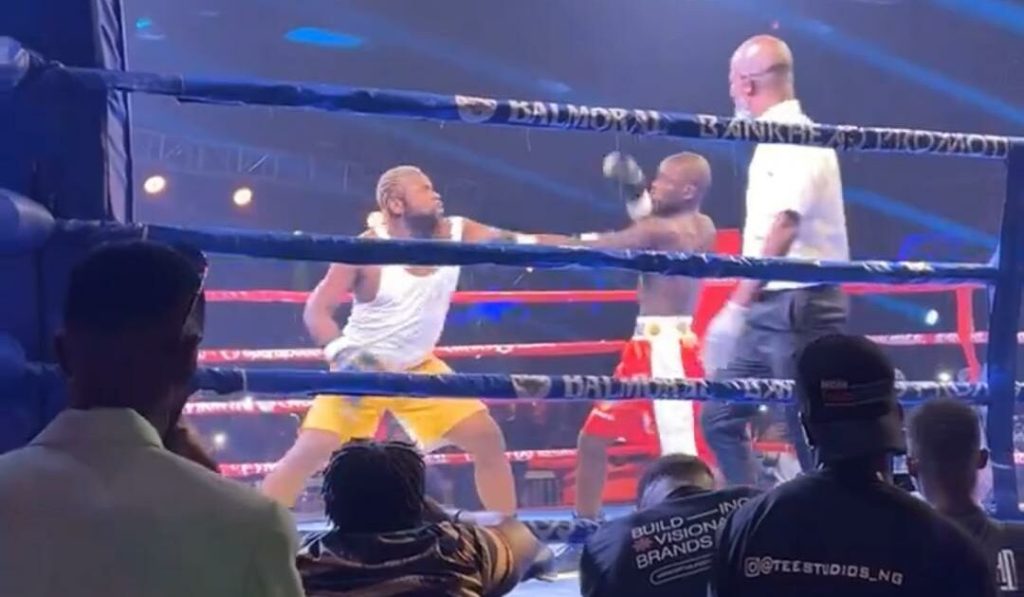The Nigerian music scene witnessed a dramatic turn of events following a celebrity boxing match between two prominent artists, Darlington Okoye, known professionally as Speed Darlington, and Badmus Okikiola, popularly known as Portable. The match, held as part of the ‘Chaos In The Ring’ event organized by Game Rush and Balmoral Promotions, culminated in a victory for Portable, but the aftermath was far from celebratory. Speed Darlington, in a video posted on social media platform X (formerly Twitter), leveled serious accusations against his opponent, claiming that Portable utilized traditional charms, commonly referred to as “juju,” to influence the outcome of the fight. This allegation has ignited a firestorm of controversy and debate within the Nigerian entertainment industry and beyond. Speed Darlington’s claim stems from an unexplained shoulder dislocation he suffered during the match, a physical ailment he insists was not the result of fatigue or any conventional injury. He expressed his suspicion that Portable introduced some form of charm into the ring, leading to his unexpected and unexplainable injury and subsequent defeat.
The ‘Chaos In The Ring’ event itself was part of an ongoing series of boxing showcases promoted by Game Rush and Balmoral Promotions. The organizers had previously held a similar event in December 2024 and had also launched the ‘Friday Fight Night’ series in February 2025, indicating a growing interest in celebrity boxing within the Nigerian entertainment landscape. This particular match, however, gained notoriety not for the sporting aspect, but for the accusations of mystical interference that followed. The incident highlights the complex interplay between traditional beliefs and modern entertainment in Nigeria, where allegations of juju use are not uncommon, especially in competitive arenas. The boxing match, intended as a form of entertainment, inadvertently became a platform for a discussion on the persistence of traditional spiritual beliefs in contemporary society.
Speed Darlington’s accusation adds another layer to the already fraught relationship between the two artists. Prior to the boxing match, tensions had been brewing between them, reportedly stemming from a perceived slight over a performance fee. According to reports, Speed Darlington had offered Portable ₦500,000 to perform at an event, an offer which Portable allegedly deemed insulting, further exacerbating the animosity between them. This pre-existing tension may have contributed to the intense atmosphere surrounding the match and could potentially be influencing the narratives surrounding the outcome. While the truth behind the shoulder dislocation remains unclear, the incident underscores the competitive and sometimes volatile nature of the Nigerian entertainment industry.
The allegation of juju use has sparked a wide range of reactions online, reflecting the diverse perspectives on traditional beliefs within Nigerian society. While some dismiss the claim as mere superstition or an attempt to deflect from a legitimate defeat, others believe in the power of such charms and view the accusation as a serious matter. This division in opinion underscores the ongoing tension between traditional spiritual practices and modern scientific understanding in Nigeria. The incident also brings to the fore the importance of cultural sensitivity when discussing such topics, especially in a public forum. Regardless of one’s personal beliefs, the allegation highlights the prevalence of such beliefs within a segment of Nigerian society and the impact they can have on interpersonal relationships and public perception.
Portable, the victor of the boxing match, has yet to publicly respond to Speed Darlington’s allegations. His silence has only fueled further speculation and online discussions about the incident. The absence of a direct response leaves the public to interpret the situation based on their own perspectives and biases, leading to a fragmented and often polarized online discourse. The lack of clarity surrounding the incident also highlights the challenges of verifying such claims, particularly when they involve beliefs that are difficult to prove or disprove through conventional means. The absence of a clear response from Portable also raises questions about the potential legal or reputational ramifications of such accusations within the Nigerian entertainment industry.
This incident raises several broader questions about the nature of competition, the role of belief systems in contemporary society, and the ethical considerations surrounding accusations of this nature. It also underscores the power of social media in amplifying such controversies and shaping public perception. The case of Speed Darlington and Portable serves as a microcosm of the larger cultural and societal dynamics at play within Nigeria, highlighting the complexities of navigating a landscape where traditional beliefs coexist with modern practices and where accusations of mystical interference can have significant real-world consequences. The ongoing discussion surrounding this incident serves as a reminder of the importance of respectful dialogue and understanding when addressing issues that touch upon deeply held cultural and spiritual beliefs.














